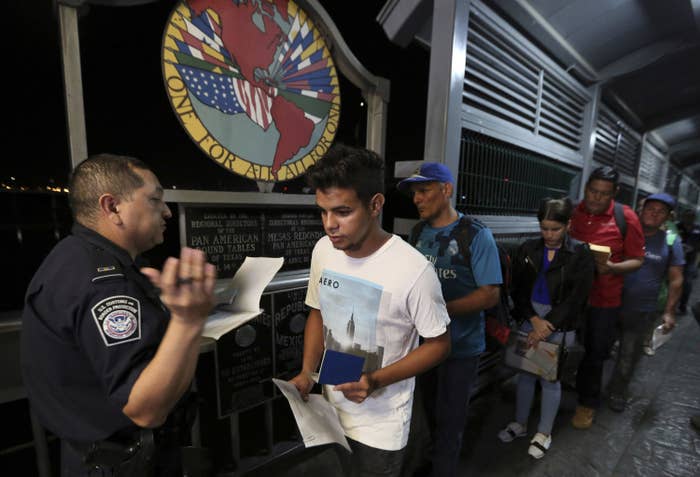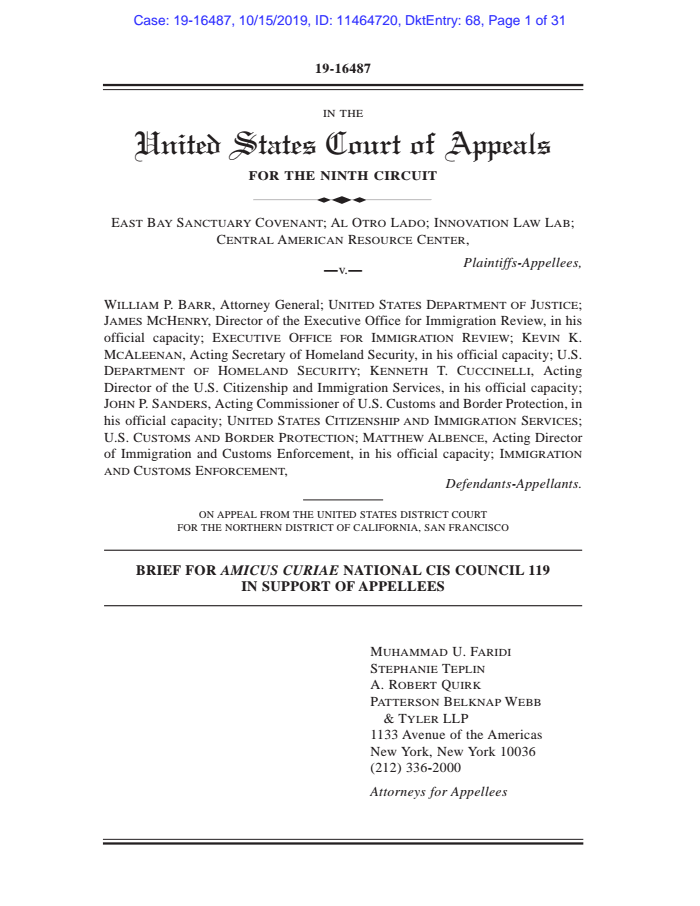
Hundreds of Department of Homeland Security asylum and refugee officers urged a federal appeals court on Tuesday to block a policy from the Donald Trump administration that virtually bans asylum at the southern border, writing that it “defies our nation’s asylum laws and ... rips at the moral fabric of our country.”
The amicus brief filed in the 9th Circuit Court of Appeals is the latest public challenge by the union representing the officers, which has previously pushed back on a policy forcing asylum-seekers to remain in Mexico as their cases proceed in the US. Its latest move offers a window into the struggles of the officers who are forced to carry out policies under the Trump administration that they find illegal and unconstitutional.
“Asylum officers who do this work are the ones tasked with applying it. We are the hands-on agents of this policy, and I don’t know of any asylum officers who think it is the right thing to do,” said Michael Knowles, an asylum officer and spokesperson for the National CIS Council 119, the union that filed the brief and represents thousands of US Citizenship and Immigration Services employees worldwide, including about 700 refugee and asylum officers.
The regulation at issue makes anyone traveling through Mexico by land to the southern border ineligible for asylum if they have not first sought protection there before reaching the US. Hundreds of thousands of Central Americans and others were expected to be affected by the restrictions that took effect in July.
After the policy was blocked by a federal judge in San Francisco in September, the Supreme Court decided it would allow the federal government to fully enforce it while a legal challenge to the rule moves forward in the 9th Circuit Court of Appeals.
“When Council 119’s members enlisted to become asylum officers, they took a solemn oath to uphold the Constitution and the laws of the United States,” the brief states. “They have been specifically charged with furthering our country’s tradition of fulfilling its moral and legal obligations to protect those who were persecuted on the basis of a protected class. They did not sign up to carry out a policy that defies our nation’s asylum laws and that rips at the moral fabric of our country."
Knowles said that he had no knowledge of any similar legal actions prior to the Trump administration by the union representing asylum officers.

“We never really did have to speak out like this, because our country pretty much adhered to the laws it was supposed to adhere to,” he said.
The policy was initially blocked from being implemented across the border in July by US District Judge Jon Tigar in San Francisco. Soon after, a three-judge panel from the 9th Circuit Court of Appeals said that the policy could only be blocked in the areas it oversaw — California and Arizona. As a result, USCIS officials restarted the policy in New Mexico and Texas. Advocates, however, pressed Tigar to again issue a nationwide injunction, which was later implemented. But in September the Supreme Court found that the Trump administration could move forward with the sweeping policy. The government's appeal of Tigar’s injunction will now proceed before the 9th Circuit Court of Appeals.
In the brief filed Tuesday, union officials wrote that the Trump administration has repeatedly labeled the influx at the border as a “crisis.” The solutions proposed by the administration, they stated, have made the system “inhumane, chaotic, and inefficient.”
“The Third Country Transit Bar is the most inhumane and counterproductive measure yet,” the union wrote, claiming the policy is not consistent with asylum law. “It is designed to slam the asylum door shut on virtually all refugees — including unaccompanied minors — entering the United States through our nation’s southern border.”
The ban applies not just to Central Americans, but any immigrants who are not Mexican but travel through Mexico and are apprehended at the border. In recent months, Cubans, Haitians, and Venezuelans have applied for asylum at the southern border in larger numbers.
“The Third Country Transit Bar’s conflict with federal asylum law is demonstrated by the absurd and unreasonable results that it yields,” the union brief read.
Under the rules, the union explained, a war criminal could pass a “credible fear” asylum screening if they demonstrate that they applied for and were denied asylum in another country. But an individual who has a demonstrated fear of persecution in their home country and the third country would be denied asylum if they cannot prove they were denied asylum in the third country.
“A rule that allows for these types of absurd results that defy the purpose and framework of our asylum system cannot be said to have any reasonable basis,” the union explained.
The case is expected to be argued in December in San Francisco.
“We are hands-on in this, and it is really wrong,” said Knowles, explaining that carrying out the policy had been hard on his colleagues. “They are basically being given no choice but to enforce it.”

